Richard Armitage + madeleines
This is a musing with the caveat that I have no idea which parts Richard Armitage will read in the staged reading of Pinter’s screenplay of À la recherche du temps perdu. I read the first four volumes in the older English translation as Remembrance of Things Past while I was living in Germany in 1999 (long story). I stopped reading it because that was the last volume my source had in English and I didn’t want to read it in German. Somehow I never started again — I think because although the reflections are often singularly beautiful, there’s no strong plot to drive one on and the characters are remarkably motionless for my taste. This work fits in loosely with a number of things we know Armitage has enjoyed (The Master and Margarita, Crime and Punishment, works by John Fowles) in terms of its modernist associations and heavily atmospheric feel. There’s a newer translation (1992) available with the more literally accurate title, The Search for Lost Time. I have not looked back at the novel to write this, nor have I ever read the screenplay. Just the usual: musings about the appeal of the work in general and its intersections and affinities with me and with Richard Armitage.
***
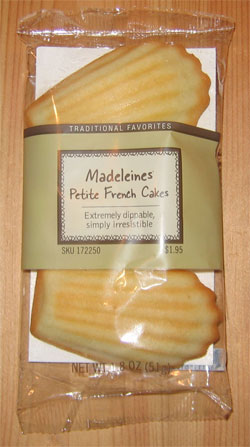 The image most often associated with Proust even by those who’ve never read his work, is that of the madeleine. Those who’ve never tried one can obtain three in a small package at almost every Starbucks and try them that way, first. They’re baked in a pan that makes them look like a mussel shell, and the fluting of the backside of the little cake means that the outside layer is just a little severe, while the inside is spongy and orangey or lemony. They’re better warm, but I would say I buy a package once or twice a week. I like them with green tea — dry enough to absorb the tea flavor, but still moist enough to be enjoyable (and not fall to pieces in the tea like a biscotto does in coffee). My ex-SO’s mother always used to bake madeleines and send them in their dozens to her granddaughters here and there; they are definitely the sort of cake for a child: small, compact, tasty, not crumbly or difficult to eat.
The image most often associated with Proust even by those who’ve never read his work, is that of the madeleine. Those who’ve never tried one can obtain three in a small package at almost every Starbucks and try them that way, first. They’re baked in a pan that makes them look like a mussel shell, and the fluting of the backside of the little cake means that the outside layer is just a little severe, while the inside is spongy and orangey or lemony. They’re better warm, but I would say I buy a package once or twice a week. I like them with green tea — dry enough to absorb the tea flavor, but still moist enough to be enjoyable (and not fall to pieces in the tea like a biscotto does in coffee). My ex-SO’s mother always used to bake madeleines and send them in their dozens to her granddaughters here and there; they are definitely the sort of cake for a child: small, compact, tasty, not crumbly or difficult to eat.
For those who have not read the novel(s), the deal with Proust and the madeleine is that when the narrator of the work eats one, he’s transported back into his childhood, when his aunt ate them for breakfast with her tea and he was given a bite on Sunday mornings. The novels have a number of themes, not least an argument for the role of art as the most desirable mechanism for finding and holding the lost past again. One focus of this general emphasis is the question of memory. Scholars in multiple fields in the U.S. were heavily occupied with the study (especially of the accuracy of traumatic) memory in the 1990s and so it’s no coincidence that the 90s brought with them both a new translation of Proust and a renewed examination of what he had to say about memory in the European modern. Too, the experience of doing one thing and instantly being transported back to another moment is one that many adults of my acquaintance have. I certainly do. One reason I became interested in memory, frankly, is that I have been cursed with a really good one. I have a hard time forgetting things and it constantly causes me problems.
Memory is a strong theme of almost all cultural production in the western European modern; historians have argued for the fundamental break of the revolutionary period after 1789 and the ways in which it established irreparable ruptures with the past. They have also pointed out the normalization and acceleration of time itself in the wake of the French Revolution. If things could change (and become better), they were, however, now also stood at risk of falling into desuetude, such that the fabric that sustained a particular memory was always in danger of disappearing. One consequence of this, we might suppose, is the increasing location of memory in the mind and spirit (as opposed to in physical locations or places of memory). The memory studies of Freud, for instance, coincided roughly with Proust. If the place were lost, the mind could still contain the memory.
These themes show up in Armitage’s work, which is not particularly surprising, given the increased concern given to a particular kind of autobiographical memory of the past (and its motivational qualities for the individual and the individuated self) in modernity. In other words, responding to memory is a problem that every modern character confronts in some way or other. What’s interesting of course, is how Armitage chooses to play them.
The madeleine invokes a particular kind of sense memory that is ultimately involuntary. One tastes the cake and is transported into the past. The involuntary sense memory that popped immediately into mind as most memorable to me in Armitage’s work occurs in Spooks 7.3, when Lucas is suddenly showered with water after a meeting with a colleague.
Lucas, the character who perhaps most wants to forget his past, is reminded of it accidentally as the rain hits him unexpectedly. His reaction is immediate and visceral, drawing him back into his experience with his Russian interrogators and torturers.
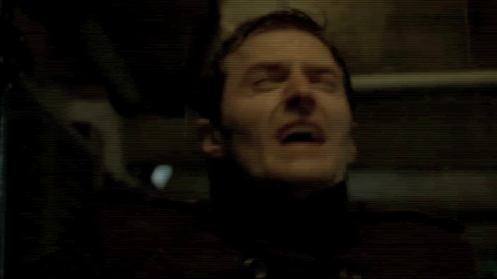

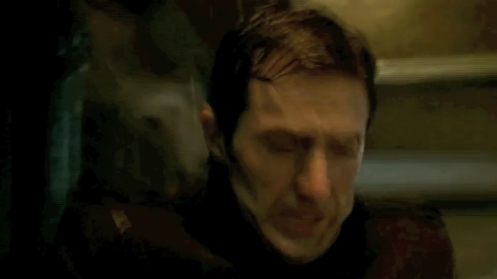

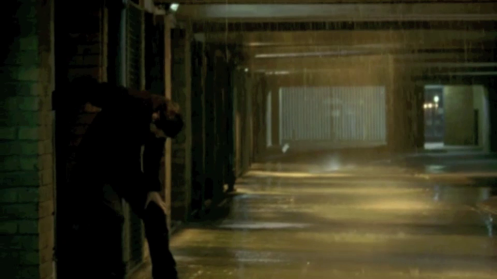
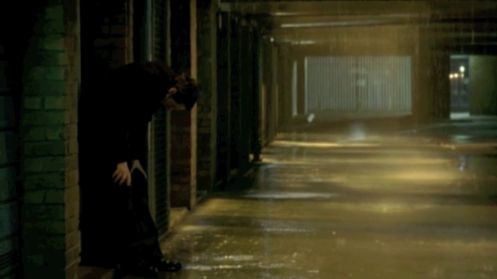 Lucas North (Richard Armitage) has a flashback to his time in Russian in Spooks 7.3. My caps.
Lucas North (Richard Armitage) has a flashback to his time in Russian in Spooks 7.3. My caps.
Interesting about this — the way in which the memory of his torture in Russia contorts Lucas’ entire face, causing his mouth and lips almost to lose definition. The caps above overaccentuate this quite a bit because of the image twitter due to interlacing (as opposed to progressive scan), but even factoring that in, Armitage’s face is still incredibly mobile here. Fascinatingly, this is one of the scenes in which his features appear most to melt — almost as the memory of what’s happened to him undoes Lucas entirely. (As we know, Armitage had his own sense memory to help him in playing this scene, as he agreed to be waterboarded to prepare for it.) Physically, Lucas curls on himself and is bowled to the side by the power of the memory he’s just experienced.
The power of this scene carries Armitage into his portrayal of the subsequent scene. (One of many things that I admire about Armitage’s work is that he typically manages a strong level of convincing festural and vocal continuity between scenes that are almost certainly filmed out of sequence. We can point to a number of places in his oeuvre where he begins a scene with an obvious transitional move from a previous one. (A particular favorite of mine is John Porter’s reference to his brutally extracted tooth in Strike Back 1.2.) Above, the subsequent scene to the flashback to Russia comes at about 0:53, when Lucas goes in to tell Harry about his flashback.
In this scene, I’d particularly like to distinguish two qualities of Lucas’ voice — first, his diction, which is uncharacteristically light (almost as if Armitage is avoiding touching his teeth — in contrast to Lucas’ usually crisper speech) and held back — Armitage is not enunciating here at all; second, the pitch. This looser diction than usual makes his speech sound tentative, almost a bit drowsy, nearly unformed at times. Enervated, perhaps, as if the conversation is costing much more than Harry realizes. The other matter is the pitch — Lucas starts the scene at at a relatively high pitch in Armitage’s range (high speech is a clear distress signal in a number of Armitage’s earlier characters; Thorin would change this pattern slightly) — but it never falls significantly into normal range, and indeed, as Lucas is leaving the office, at 1:23, it sounds like it’s rising again. Indeed, it’s not until Lucas leaves Harry’s presence that he establishes his normal vocal range.
The other thing are the really rich microexpressions as Lucas insists on his version of the story — that the interrogator really wanted to know about “Sugarhorse.” Here are a few:
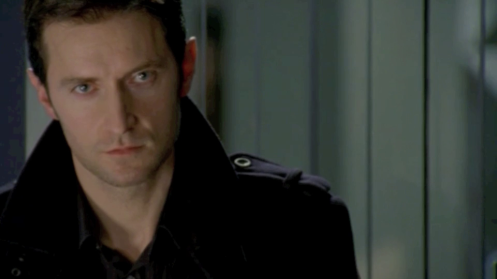
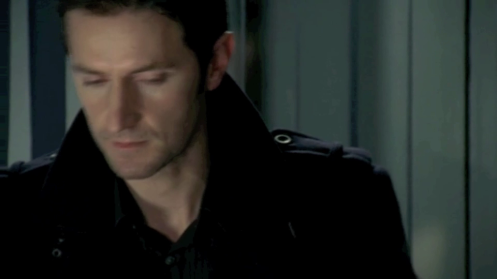

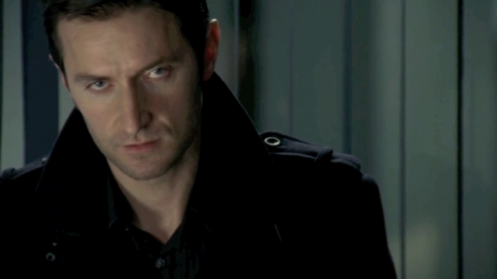
 Lucas North (Richard Armitage) tells Harry that he’s remembered the name “Sugarhorse” from his interrogation, and wants an explanation, in Spooks 7.3. My caps.
Lucas North (Richard Armitage) tells Harry that he’s remembered the name “Sugarhorse” from his interrogation, and wants an explanation, in Spooks 7.3. My caps.
In combination with Armitage’s voice, we see here: hesitancy (and a very unfirm holding of the mouth at the beginning, almost as if his mouth hurts him, or as if it’s difficult to get the words out if he doesn’t speak as gently as possible — I’m having a hard time describing what I’m seeing here, but it’s fascinating nonetheless), shame, fatigue, exhaustion, pain, avoidance, and a touch of introspective frustration. Playing against Harry (whose denials are so flat that they seem obvious and cause Lucas to ask, as well, as he’s leaving, making the last entreaty that he didn’t want to suffer for nothing), they enhance our awareness of how badly this particular traumatic memory is hurting him — and also of what the cost is to reveal it to Harry.
Lucas’ torture is, of course, not the kind of sense memory that Proust sought to evoke in his own work — for Proust, the madeleine is a pleasant rather than a traumatic memory. The psychologists of the modern felt strongly that these involuntary memories were purer precisely because they happened apparently against our will and took us by surprise in their appearance and in the associations they drew. We tend to find these sense memories very telling; for instance, I was reading an article today on the quintessential smells that call Britain to mind for people who leave. Proust contrasted this kind of memory in his work with the intentional search for the past, with the desire to find it again somewhere. The obvious connection in this theme with Armitage’s work are the scenes that have to do with memory in North & South. That’s for tomorrow, I think.




An amazing scene – the trauma is absolutely palpable there, even without the visualised flashback. What I found most evocative in the acting of this scene was actually the voice. That was so chillingly convincing, the terror, the fear for his life, the pleading, the despair. Sorry, tangent.
I find it very interesting that in the two examples – the madeleine-eating in Proust and Lucas’ flashback – the memories are evoked by the senses of touch and taste. Just because I find my memories mostly triggered by smell. Or at least the memories which hit me by surprise.
LikeLike
I linked to a smell generated memory (British smells — I don’t know how peculiar those are, but I do think British museums have a particular smell that differs from German ones) but I think Proust wouldn’t have made it dependent on touch or taste; smell would have been fine for him. The general point was that a sense memory is on some level triggered entirely arbtirarily.
I think one of the consequences of Armitage moving his voice artificially downward for Thorin was that he lost some of the potential for that anguished strain in his normal baritone. And it’s fascinating to me that he can refine that utter despair of the torture seen to remind, but not reproduce, in the scene with Harry.
LikeLike
My college’s yearbook is called The Madeleine. I’ve always thought it was a good name for it — more so as the time goes on.
I’ve been learning, lately, that for many people the triggers for their memories (both good and bad) can be surprisingly indirect. For Lucas, it’s the water, and that makes sense as a connection, but apparently memories can be associated with sensory experiences in unexpected ways.
Thanks for bringing this up for me to think about. 🙂
LikeLike
I would, in general agree with that. You don’t know always know what will trigger a memory.
LikeLike
Thanks for the very brief synopsis of sorts on Proust’s work. I’ve never attempted to read it.
Great detailing of a profoundly acted memory-triggered moment. Armitage certainly dwells in his characters’ mental space while he performs.
LikeLike
there’s a long, detailed symopsis at Wikipedia if you are interested 🙂
LikeLike
David Duchovny and Tea Leoni’s daughter is named Madeline and they’ve said it’s from Proust.
LikeLike
not from the children’s book character 🙂
LikeLike
I assume they spelled it correctly, as opposed to me. 🙂
LikeLike
one is the French spelling, one the English … honestly, I think parents do their kids a favor who don’t give them difficult names to spell 🙂
LikeLike
I learned how make madeleines because of that. Ah, memory 🙂
LikeLike
🙂
LikeLike
I visited France in the early 90’s and remember buying Madeleines in a bakery. Every time I see them in Starbucks I remember that wonderful trip. Loved them.
LikeLike
French pastry!!!!
LikeLike
Current research (& our own experiences) give plenty of evidence that the two strongest triggers for memory in most people are smell/scent, followed a close second by taste. Actually the two senses are intimately bound in us mammals: some of them, like dogs & cats, can “taste” the scent of something in the air through a specific organ, while people certainly do say, “I can almost taste how good that smells,” when something yummy is cooking. People can become nauseous from strong (unpleasant or pleasant) odors, and who hasn’t had a stuffy nose and, not being able to smell their food, didn’t enjoy a favorite as much as usual despite temp., texture, seasoning, etc. all being as usual? As for actually triggering memories, scent & food are often components of cognitive therapies for people with memory problems which resulted from causes as different as dementia and traumatic brain injuries (TBI). They can even become memory aids for some people. Or assist in word finding for some people after a stroke, even aid fluency for some stutterers (well, that’s what he claimed, and it sure relaxed everybody else, which helped them stutter less…)
I find watching RA fascinating (for a whole host of reasons which this comment is not here for) and can seem to find subtleties, nuances or just enjoy watching despite (b/c of?) repeated viewings. But I confess: I rarely view the flashback scene: I usually skip it. If I had to choose one or the other to watch, I’d pick the scene with Harry every time. Not because I think it’s better or worse (they really are both excellent), but the flashback just happens to hit me in places I don’t like to think about very much (so totally personal issue here). While I can’t speak with any but total amateur conjecture on the acting challenges here, I do have the knowledge & experience to comment on what he does with/to his face here. It’s tricky since it’s essentially non-verbal: facial expressions combined with body posture & motion, some of which are actually reflexive. And he nails it: it’s riveting, it’s gut-wrenching. If I didn’t know better, I’d say he’d met someone I once saw shatter into pieces. And you just don’t see him acting. And whenever I do watch it, it breaks my heart, all over again.
LikeLike
I used to have a category, “too painful to watch” and this scene verges on that. It’s not the worst Lucas North scene for me, though. The worst ones are all in series 8.
LikeLike
Yes, Season 8 had some excruciating scenes. Not the best Spooks writing/dialogue. We might not be on the same wave-length here, Servetus, but some scenes just had me plain embarrassed – they were “ham-handed”. Not some of acting, so much, but dialogue and situations.
LikeLike
yeah, I think we’re talking about different things — I meant scenes I can’t watch because they are so visceral they can be triggering.
LikeLike
So much can bring a memory, taste, smell, hearing, seeing and touch. I think I have covered them all. I have been spending type down the musical memory lane as of late.
Some of the Spooks scenes are very hard to watch, you feel from Lucas and the bad memories he is dealing with.
LikeLike
yes, exactly. That scene after Oleg Darshavin leaves his apartment in Spooks 8.4. That’s not a sense memory but. That’s one I have to ration watchings of.
LikeLike
[…] from here, on the question of affinities between Richard Armitage’s previous work and the theme of […]
LikeLike
A little more Proust + North & South + Richard Armitage | Me + Richard Armitage said this on January 16, 2014 at 8:38 pm |
[…] […]
LikeLike
Anonymous said this on January 19, 2014 at 11:18 pm |
[…] your comment via Google translate), but thanks for the long and serious commentary on the “madeleines” post! I didn’t raise the question of Porter’s return to the apartment in Basra […]
LikeLike
Hi, Onyx, if you should see this — спасибо! | Me + Richard Armitage said this on January 19, 2014 at 11:43 pm |